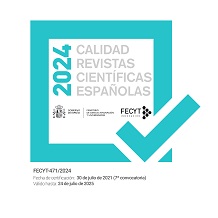Transferring research results to the classroom: Fall incidence records
Abstract
Background: Complete and correct records of fall events help to implement prevention measures. However, there is lack of knowledge among healthcare personnel about the existence of a recording system or the need to record such events. The purpose of this study was that the nursing students make quality records of the fall events, and consequently to develop and implement a system to record patient fall incidents (REOC) for use during the clinical practicums of nursing students.
Method: Participatory action research (critical incident analysis) was carried out at a nursing school in southern Spain and its reference hospital. Among other variables, the implementation of the REOC (intervention), the complexity of records and the students’ learning outcomes were assessed.
Results: The recording instrument had a significant impact on patients’ health outcomes. The REOC was of medium (42.9%) and low complexity (42.9%), while 71.4% acquired new skills through the implementation. Learning outcomes were of an average level in 71.5% of the cases and positive in 28.6%.
Implications for Practice: The proposed project is an example of an innovation-research-innovation experience carried out in a teaching-learning setting using a cyclical knowledge transfer and feedback process.
Downloads
-
Abstract401
-
PDF (Español (España))338
-
PDF338
The works published in this magazine are subject to the following terms:
1. The Publications Service of the University of Murcia (the publisher) preserves the copyright of the published works, and encourages and allows the reuse of the works under the license for use stated in point 2.
© Servicio de Publicaciones, Universidad de Murcia, 2011 (© Publications Service, University of Murcia, 2011)
2. The works are published in the electronic edition of the journal under Creative Commons Reconocimiento-NoComercial-SinObraDerivada 3.0 España(texto legal) “ a Attribution-NonCommercial-NoDerivatives 3.0 Spain license (legal text)”. They can be copied, used, broadcasted, transmitted and publicly displayed, provided that: i) the authorship and original source of their publication (journal, publisher and URL) are cited; (ii) are not used for commercial purposes; iii) the existence and specifications of this license is mentioned.
3. Conditions of self-archiving. Authors are allowed and encouraged to electronically disseminate the pre-print (pre-reviewed ) and / or post-print (reviewed and accepted for publication) versions of their works prior to publication, as it ensures a wider circulation and dissemination which may lead to a possible increase in its mention and a higher scope among the academic community. RoMEO color: green.












